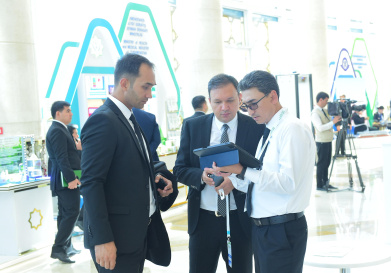Which products with the brand "made in Turkmenistan" are profitable to sell abroad
07.03.2023 | 01:15 |The growth of Turkmen exports and its diversification are accompanied by an active increase in the share of the non-oil sector of the economy and the expansion of the range of goods exported to foreign markets. The figures "speak" for themselves – the total export volume of the country in 2022 amounted to about $ 20 billion, and import – about $ 7 billion.
In an interview with an ORIENT journalist, the consultants of the Turkmen State Institute of Economics and Management explained that when using the system of the Manchester Economic School of free trade, proclaiming freedom of trade and non-interference of the state in the economy and business activities of society, customs costs, including excise taxes, can form from 5 to 15% of the cost of goods. Therefore, the profitability of the import and export of goods is largely determined by their exemption from customs duties and other payments equivalent to customs duties, as well as from the absence of restrictions on the volume of transportation.
ORIENT has compiled a list of goods, the import and export of which across the border of Turkmenistan is a profitable business for both legal entities and individuals. It should be noted that within the framework of the Turkmen legislation, the procedure for registration of export-import operations for legal entities is carried out strictly according to the instructions. This makes it possible to provide reliable customs and transit information.
Profitable export and sale
Among the goods "exempt" from customs duties and which can be exported from Turkmenistan in unlimited volume are: sewing and knitting products, shoes, fabrics, tobacco products, alcohol, TV-video-audio equipment and radio equipment, cars, carpets and carpet products (including machine), mineral water and soft drinks, pasta, bee honey, edible salt, tomato paste, food ice (ice cream, etc.), iodine products, therapeutic mud and sea salt, cotton cosmetics and dressings, canned food, leather, glue, confectionery, cottonseed oil.
It should be noted that the export of vegetables, melons and fruits is not subject to duties only two months a year – in July and August.
Also, the goods purchased in the border shopping centers of Turkmenistan and in duty-free shops are duty-free.
Profitable import and sale
The list of goods for which customs duties are not paid and which are not limited in quantity when imported into Turkmenistan includes: all types of meat, vegetable oil (except cotton), butter, matches, seed wheat, as well as wheat for poultry feed (based on the conclusion of the Ministry of Agriculture), flour milling products, sugar and eggs for incubation.
What cannot be imported and exported across the border of Turkmenistan?
These are, first of all, goods that may pose a threat to the safety and life of citizens, as well as if their "movement" contradicts international agreements in force in Turkmenistan. Compliance with the order is monitored by the Turkmen customs, which currently unites about 37 import points. The largest number of such posts (11) is located in the Balkan region.
Such goods include, among others: personal protective equipment (gas canisters, stun guns, brass knuckles); weapons with the release of plastic bullets; cars with right-hand steering; cars that are under 5 years old from the year of manufacture; sports cars; ammunition and military equipment; poisons and toxic substances; cancelled securities.
What can not be exported from Turkmenistan to individuals?
The list of such goods is relatively short, they include mummies, licorice root and its extract, propolis, precious stones and their semi-finished products, jewelry without a sample, poultry, sturgeon, animals and plants listed in the Red Book of Turkmenistan.
What goods do individuals need permission from government agencies for?
− firearms, cartridges, starting pistols (MIA);
− radiotelephones, radio stations, radio electronic devices (Radio Frequency Commission under the Cabinet of Ministers);
− archival materials (Main Archive Department under the Cabinet of Ministers);
− works of art and antiquities (Ministry of Culture);
− antique carpets and handmade carpets (State Association "Turkmenkhaly");
− ancient icons, religious books and objects of worship (Commission for Work with Religious Organizations);
− Alabai and tazy dogs, songbirds and hunting birds, (State Committee for Environmental Protection and Land Resources of Turkmenistan).
In recent years, the Turkmen customs service has significantly softened the procedure for imposing duties on goods, it is even appropriate to say that it has made it "flexible" and adapted. An important role in this process was played by the opening and development of new transport and logistics routes, as well as the orientation of the state economic policy to increase trade turnover. The same favorable situation is developing with cross-border trade in the country.
Arslan MAMEDOV











